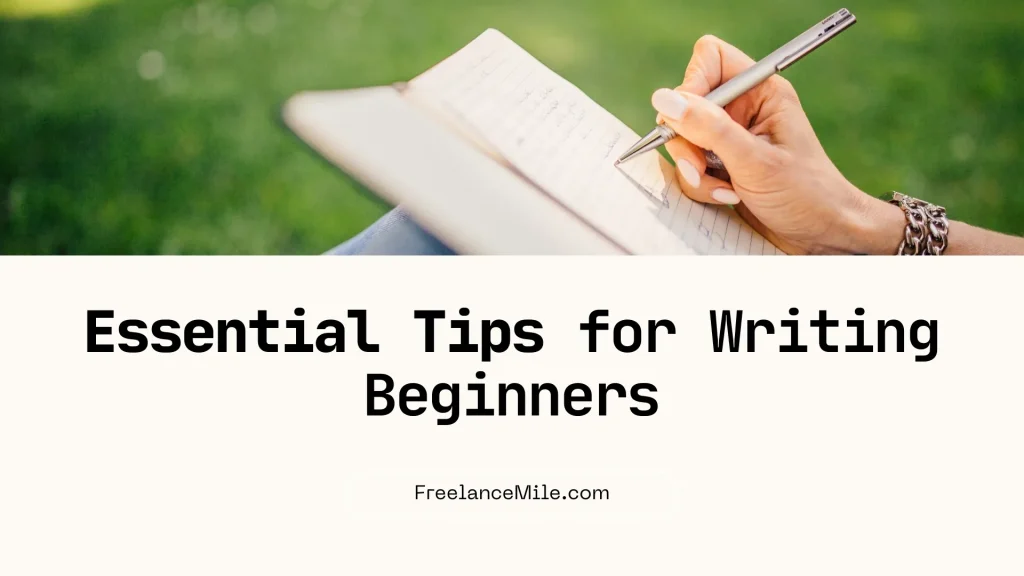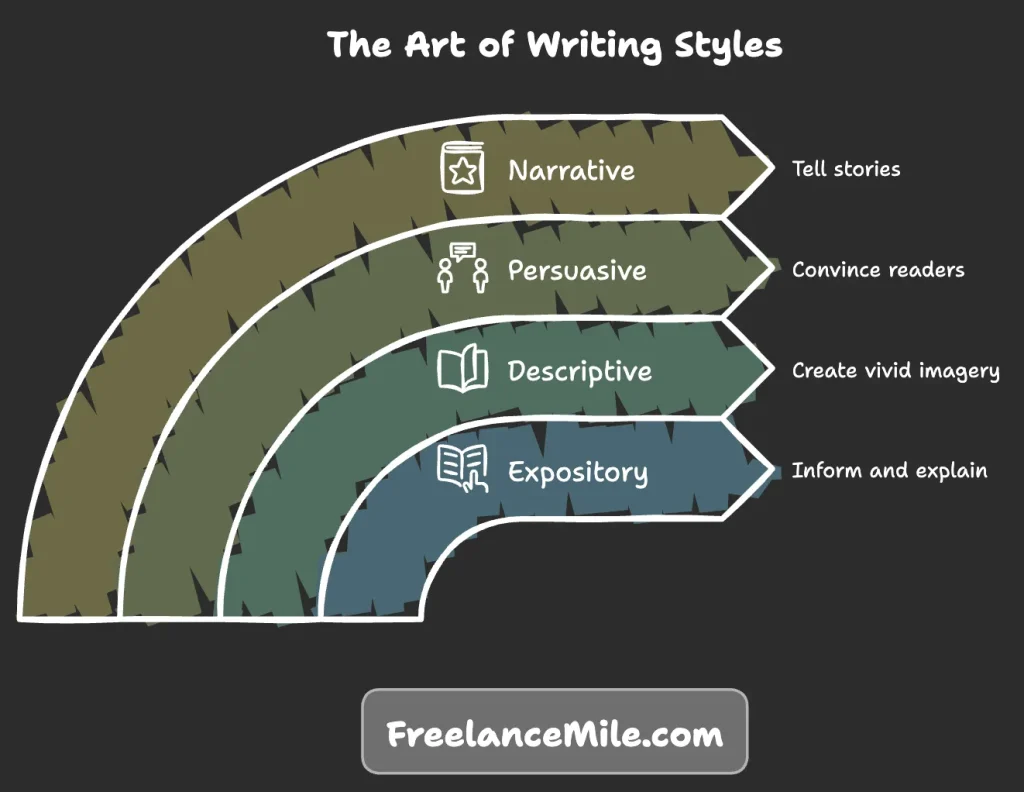To start writing, first get your ideas together. Then, pick your tools and set a writing schedule. Reading a lot and writing often are key steps. These steps help beginners start their writing journey. For more details on these tips, keep reading. If you have questions, ask in the comments below.
Starting to write can feel scary for beginners. But, with the right steps, you can turn your ideas into great stories. Whether you want to write for fun or for work, knowing the basics is important. Let’s look at some key tips to start your writing journey.
Writing has many forms. Some write to share facts, while others create vivid pictures with words. There’s also storytelling and trying to convince readers. Learning these styles can make your writing better.
Stephen King says reading a lot is very helpful. It shows you different writing styles and what readers like. As you read more, you’ll pick up new ideas and techniques for your own writing.
Key Takeaways
- Understand different writing types: expository, descriptive, narrative, and persuasive
- Read widely to improve your writing skills & gain inspiration
- Master grammar, punctuation, and spelling fundamentals
- Write regularly to develop your skills and overcome perfectionism
- Edit and proofread your work to enhance clarity and effectiveness
- Create a comfortable writing environment to boost productivity
- Join writing groups for support and motivation
How to Start Writing: 12 Essential Preparation Steps

Starting your writing journey needs careful planning. Let’s look at the main steps to help you succeed in writing.
Step 1: Gathering ideas and inspiration
Finding inspiration is key. Carry a notebook to write down ideas from daily life. J.R.R. Tolkien got The Hobbit idea from a simple note.
J.K. Rowling’s Harry Potter series began with a boy wizard image.
Step 2: Choosing your writing tools
Picking the right tools can help you write better. You might like a notebook or digital apps. Many writers use special software to organize their ideas.
Step 3: Setting up a writing schedule
Having a regular writing schedule is important. Some writers aim for a certain number of words each day. For example, one writer writes at least 200 words daily.
Find a schedule that fits your life and stick to it.
Step 4: Read Widely and Often
Good reading habits are vital for writers. Stephen King says reading different genres helps your writing. Neil Gaiman suggests reading many books in your genre before starting your own.
This helps you learn about storytelling and grow your vocabulary.
Step 5: Write Regularly
Writing often is the best way to get better. Many successful people say journaling is a key habit. Start with small daily writing tasks or prompts.
It’s okay if your writing is not perfect at first. Just keep writing.
Ernest Hemingway, renowned novelist and Nobel Prize winner, suggests that writing involves pouring out one’s innermost emotions and experiences.
Step 6: Set Small, Achievable Goals
Start with easy goals. Try to write a certain number of words each day. This helps you keep going and stay excited.
Many writers write 500 words or spend 30 minutes daily. It’s a good way to start.
Step 7: Embrace the First Draft
Don’t worry if your first draft isn’t perfect. Just write down your ideas. You can make it better later.
Write without worrying about mistakes. It’s okay to make errors at first.
Step 8: Use Writing Prompts
Writing prompts can spark new ideas. They help when you’re stuck. Try a new prompt every day.
This way, you can explore different ideas and styles.
Step 9: Learn to Edit
Editing is as important as writing. After your first draft, take time to make it better. Look for ways to make your story stronger.
Try to make your writing tighter and get rid of mistakes.
| Writing Strategy | Benefit | Success Rate |
| Daily Writing | Improved Skills | 85% |
| Using Prompts | Enhanced Creativity | 78% |
| Regular Editing | Polished Work | 92% |
Using these tips will help you get better at writing. Remember, keep writing and always be curious. Never stop learning.
Step 10: Seek Feedback
Getting feedback on your writing is very important. Join a writing group or locate a critique partner. Their advice can help you see things you missed and make your writing better. Always be open to feedback, but also trust your own voice.
Step 11: Study the Craft
Learn as much as you can about writing. Read books on writing, go to workshops, or take online classes. Look at the work of writers you like. Notice how they tell stories and structure their writing. Learning never stops, and it will make you a better writer.
Step 12: Publish Your Work
Don’t wait to publish your writing until it’s perfect. Start a blog, send your work to magazines, or self-publish. Sharing your writing helps you feel more confident and connects you with readers. Remember, publishing is a journey where you keep getting better.
| Writing Activity | Benefit | Frequency |
| Seeking feedback | Identifies areas for improvement | Monthly |
| Studying craft books | Enhances technical skills | Weekly |
| Publishing work | Builds confidence and audience | Quarterly |
Start these practices to make your writing better. Remember, you grow a little bit at a time. Keep working at it, and you’ll see your progress.
The Importance of Writing for Beginners
Writing is a key skill that opens many doors. As a beginner, you might feel lost, but remember, we all start somewhere. Learning to write is a journey with many benefits.
Benefits of Developing Writing Skills
Getting better at writing can make you a better communicator and thinker. Studies show that early writing support leads to better writers later. Writing often helps you learn new words and use them right.
This skill helps you share your ideas clearly. It’s a big plus in many areas of life.
Overcoming Initial Challenges
Starting out, you might hit roadblocks like writer’s block or doubt. These are normal. Try to write a little every day. Keep a journal, write short stories, or even texts.
Writing is all around us, from books to social media. It’s everywhere.
Setting Realistic Expectations
When you start writing, it’s important to be realistic. Becoming a good writer takes time & effort. Start with small goals, like writing a few sentences each day.
Then, slowly increase what you write. Celebrate your small wins, like finishing a paragraph or sharing an idea well.
| Writing Type | Purpose | Example |
| Academic | Formal analysis | Research papers |
| Creative | Storytelling | Short stories |
| Professional | Business communication | Reports |
Remember, writing gets better with practice. Be kind to yourself and enjoy the journey to becoming a better writer.
Creating the Right Writing Environment

Your writing space is very important for your work. It doesn’t matter if you write at home or in a coffee shop. What matters is finding a place that helps you write well.
Try different places to see what works for you. Some like quiet homes, while others prefer busy places. The goal is to find a place with no distractions.
Think about these things when setting up your space:
- Lighting: Make sure your monitor is not too bright
- Ergonomics: Keep your screen at eye level to avoid eye strain
- Organization: Use folders to keep things neat
- Comfort: Have snacks and water nearby to stay focused
Don’t forget to take breaks and move around. Staying hydrated helps too. Keep important tools like dictionaries close to make writing easier.
| Writing Environment | Pros | Cons |
| Home Office | Quiet, familiar, customizable | Potential household distractions |
| Coffee Shop | Ambient noise, change of scenery | Limited control over environment |
| Library | Quiet, access to resources | Limited hours, less comfort |
| Park | Fresh air, natural inspiration | Weather dependent, distractions |
By choosing the right writing space, you’ll write better. This makes your writing journey fun and successful.
Developing Your Writing Process
Creating a strong writing process is crucial for your success. Let’s look at the steps to make engaging content.
Brainstorming Techniques
Begin by brainstorming ideas. Use mind maps, free writing, or word associations to spark creativity. This stage is all about exploring possibilities without judgment.
Outlining Your Work
After you have ideas, organize them into an outline. This roadmap guides your writing, ensuring a logical flow. Create a basic structure with main points and supporting details.
Drafting and Revising
Now, dive into drafting. Focus on getting your thoughts down without worrying about perfection. After completing your draft, take a break before revising. Look for ways to improve clarity, coherence, & impact.
| Writing Process Step | Purpose | Percentage of Time Spent |
| Brainstorming | Generate ideas | 15% |
| Outlining | Organize thoughts | 20% |
| Drafting | Create content | 35% |
| Revising | Refine and improve | 30% |
Remember, your writing process is unique to you. Experiment with different techniques and find what works best. With practice, you’ll develop a seamless flow from brainstorming to final draft.
Exploring Different Writing Styles and Formats

Writing styles let you share your thoughts in many ways. You can try out different formats to find what works best for you. Exploring genres helps you grow as a writer.
Test your hand at fiction, non-fiction, poetry, or journalism. Each style has its own skills and methods.
Expository writing tells facts without personal views. It’s great for school papers. Descriptive writing makes scenes come alive with words, perfect for nature.
Persuasive writing tries to change opinions, good for ads. Narrative writing tells stories, perfect for books and memoirs.
Trying different formats makes you a better writer. You can mix styles to create something new. For example, blend descriptive and persuasive in a travel blog.
This can make your work unique.
| Writing Style | Main Purpose | Common Uses |
| Expository | Inform and explain | Textbooks, how-to guides |
| Descriptive | Create vivid imagery | Poetry, fiction passages |
| Persuasive | Convince readers | Ads, opinion pieces |
| Narrative | Tell stories | Novels, biographies |
Study famous authors in your favorite genre. Learn from their techniques. This helps you find your own voice and master different formats.
Overcoming Writer’s Block and Self-Doubt
Writer’s block and self-doubt can stop aspiring authors. These problems often come from wanting to be perfect or fearing failure. You might wonder, “Who am I to write a book?” or “Does the world need another book on my topic?” These doubts can stop your creativity and slow you down.
Common Causes of Writer’s Block
Writer’s block comes from many places. Perfectionism, fear of being judged, and feeling too much to do are common reasons. These can make you less productive, frustrated, and doubt your writing skills. Many writers also put things off and are too hard on themselves.
Techniques to Boost Creativity
To beat writer’s block, try these ideas:
- Freewriting: Write without stopping for 10 minutes
- Change your environment: Work in a new location
- Set a timer: Write in short, focused bursts
- Use a topical outline to organize your thoughts
- Listen to calming music or ambient sounds while writing
Building Confidence in Your Writing
It’s important to build your writing confidence. Celebrate small wins, like finishing a chapter or getting good feedback. Learn from mistakes and see them as chances to grow. Remember, even famous writers like Harper Lee and Ernest Hemingway faced writer’s block. You’re not alone!
You can experience the pain of discipline or experience the pain of regret.
This quote tells us to keep going, not give up. Choose to work hard over feeling sorry later. With hard work and not giving up, you can beat writer’s block and self-doubt. You can become the writer you dream of being.
Conclusion: Embracing Your Writing Journey
Your writing journey is special. It’s a path of growth and discovery. Remember, perseverance is key to success.
Every writer, even famous ones, started as beginners. Writing, editing, & publishing a book can take over two years. So, patience is very important.
Having a growth mindset helps you face challenges. Writers often deal with writer’s block or tight deadlines. See these as chances to learn and get better.
Set clear goals and try different styles to feel more confident. Some writers use audio clips to help them write faster.
Your writing journey never ends. Talk to different people, ask for feedback, and think about your progress. You can choose traditional publishing or self-publishing.
Building an author platform is key. Use a website or blog to connect with readers. Look at sales data and reviews to improve. Stay passionate and keep improving to find your unique voice and reach your goals.







